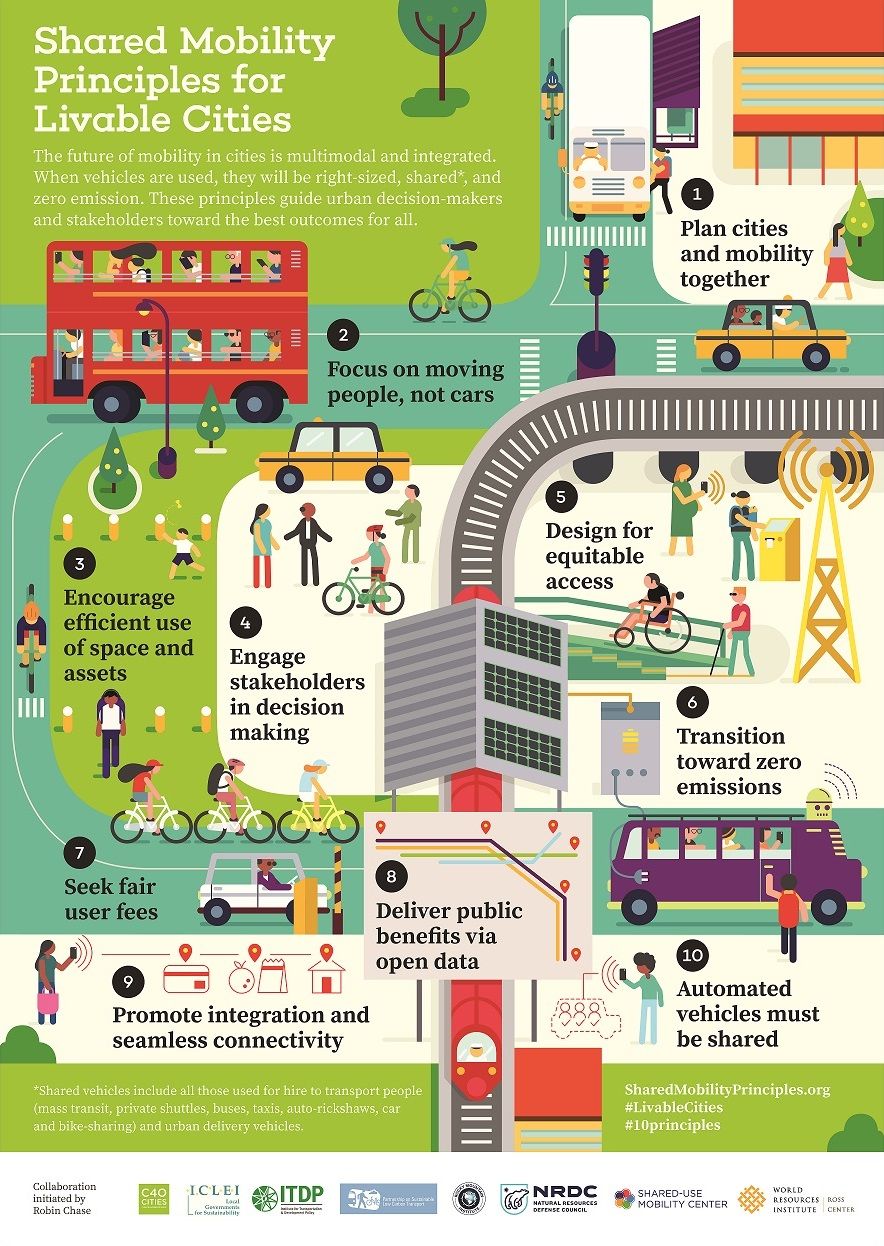How can cities ensure accessible and affordable access for everyone and prepare for a future with self driving cars? Robin Chase, a renowned mobility expert and successful entrepreneur, sheds light on these questions by proposing 10 Shared Mobility Principles for Liveable Cities. She is the co-founder and former CEO of Zipcar, the largest carsharing company in the world; as well as co-founder of Veniam, a network company that moves terabytes of data between vehicles and the cloud. She sits on the Boards of the World Resources and has received awards in the areas of innovation, design, and environment, including Time 100 Most Influential People. Scroll down to read about her thoughts and practical recommendations on how cities should move forward.

Over the last 100 years, personal cars have been cheap and easy to own, which in turn has underpriced air pollution, curb access, congestion, and even transport infrastructure. Further, we are now on the verge of fully autonomous self driving cars. Tesla promises to be selling these cars in 2018, and BMW, Ford, and Toyota say they will have fully automated (Level 5) vehicles for sale by 2021. This demonstrates that the pace of technology-driven innovation from the private sector in shared transportation services, vehicles, and networks is rapid, accelerating, and filled with opportunity. At the same time, city streets are a finite and a scarce resource. Robin’s mission is to channel the tech-driven disruption in the mobility sector to (re)build cities that are sustainable, livable, and just.
These principles, produced by a working group of international NGOs, are designed to guide urban decision-makers and stakeholders toward the best outcomes for all.
1. WE PLAN OUR CITIES AND THEIR MOBILITY TOGETHER
The way our cities are built determines mobility needs and how they can be met. Development, urban design and public spaces, building and zoning regulations, parking requirements, and other land use policies shall incentivize compact, accessible, livable, and sustainable cities.
2. WE PRIORITIZE PEOPLE OVER VEHICLES
The mobility of people and not vehicles shall be in the center of transportation planning and decision-making. Cities shall prioritize walking, cycling, public transport and other efficient shared mobility, as well as their interconnectivity. Cities shall discourage the use of cars, single-passenger taxis, and other oversized vehicles transporting one person.
3. WE SUPPORT THE SHARED AND EFFICIENT USE OF VEHICLES, LANES, CURBS, AND LAND
Transportation and land use planning and policies should minimize the street and parking space used per person and maximize the use of each vehicle. We discourage overbuilding and oversized vehicles and infrastructure, as well as the oversupply of parking.
4. WE ENGAGE WITH STAKEHOLDERS
Residents, workers, businesses, and other stakeholders may feel direct impacts on their lives, their investments and their economic livelihoods by the unfolding transition to shared, zero-emission, and ultimately autonomous vehicles. We commit to actively engage these groups in the decision-making process and support them as we move through this transition.
5. WE PROMOTE EQUITY
Physical, digital, and financial access to shared transport services are valuable public goods and need thoughtful design to ensure use is possible and affordable by all ages, genders, incomes, and abilities.
6. WE LEAD THE TRANSITION TOWARDS A ZERO-EMISSION FUTURE AND RENEWABLE ENERGY
Public transportation and shared-use fleets will accelerate the transition to zero-emission vehicles. Electric vehicles shall ultimately be powered by renewable energy to maximize climate and air quality benefits.
7. WE SUPPORT FAIR USER FEES ACROSS ALL MODES
Every vehicle and mode should pay their fair share for road use, congestion, pollution, and use of curb space. The fair share shall take the operating, maintenance and social costs into account.
8. WE AIM FOR PUBLIC BENEFITS VIA OPEN DATA
The data infrastructure underpinning shared transport services must enable interoperability, competition and innovation, while ensuring privacy, security, and accountability.
9. WE WORK TOWARDS INTEGRATION AND SEAMLESS CONNECTIVITY
All transportation services should be integrated and thoughtfully planned across operators, geographies, and complementary modes. Seamless trips should be facilitated via physical connections, interoperable payments, and combined information. Every opportunity should be taken to enhance connectivity of people and vehicles to wireless networks.
10. WE SUPPORT THAT AUTONOMOUS VEHICLES (AVS) IN DENSE URBAN AREAS SHOULD BE OPERATED ONLY IN SHARED FLEETS
Due to the transformational potential of autonomous vehicle technology, it is critical that all AVs are part of shared fleets, well-regulated, and zero emission. Shared fleets can provide more affordable access to all, maximize public safety and emissions benefits, ensure that maintenance and software upgrades are managed by professionals, and actualize the promise of reductions in vehicles, parking, and congestion, in line with broader policy trends to reduce the use of personal cars in dense urban areas.
Cities are advised to focus on:
- Supporting Shared Mobility Principles
- Fixing pricing (fair user fees)
- Joining others working on open data standards and privacy
- Building community! (make your town special; increase walking/biking)
- Having community dialogue about:
- Retail vs. online shopping and RATS (retail automated trips)
- Role of AVs and shared transport
To read more about this project and or get involved, have a look at The Shared mobility principles for livable cities site.
